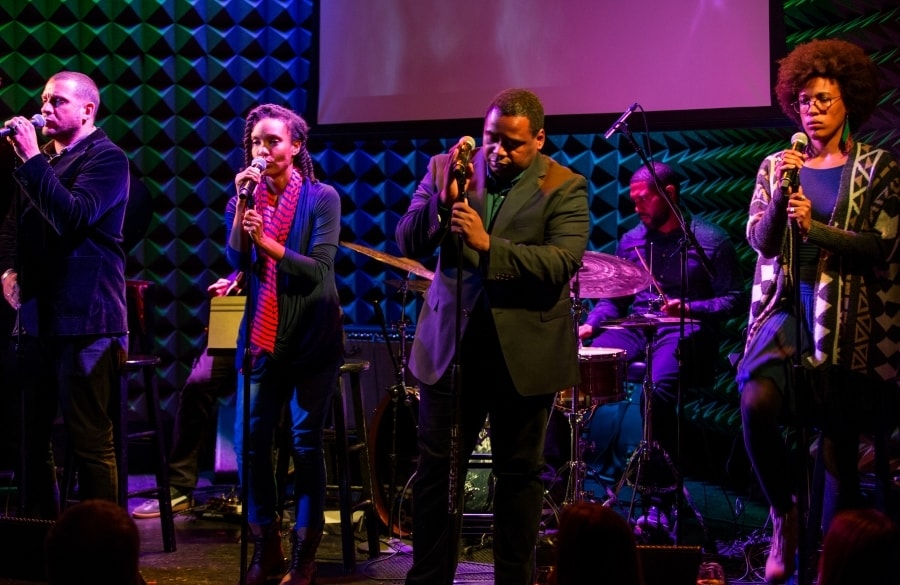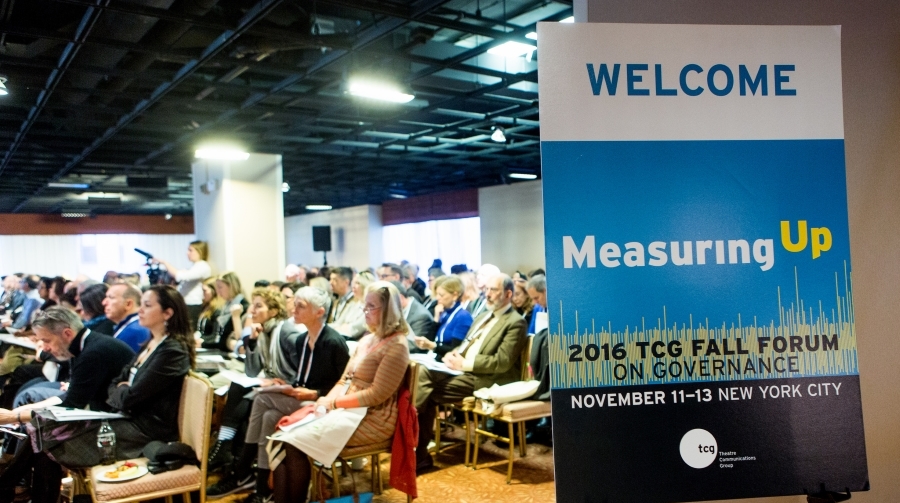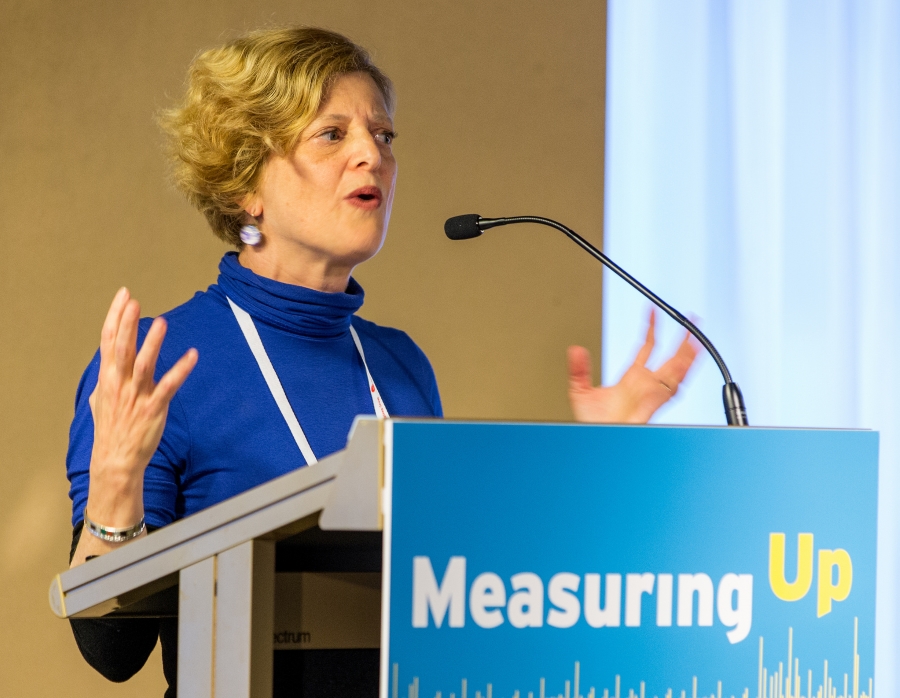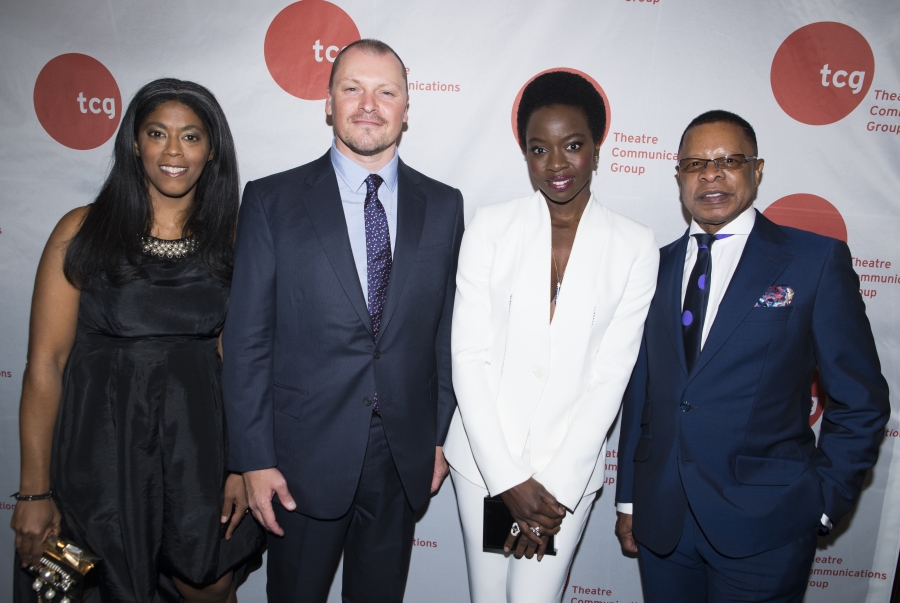Post-show talkbacks, pre-show surveys, and mailers for feedback are just some of the ways that the nation’s theatres aim to reach audiences about their programming and measure the value of their work. And data can play a huge role in setting ticket prices, building audiences, and raising funds for theatres. So how do theatre leaders put these two together: the reaching of audiences via big data? This was the animating theme of this year’s Theatre Communications Group Fall Forum on Governance, Measuring Up, which explored research trends, data ethics, and effective ways to put mission-driven data into practice.
But while trustees and theatre leaders from across the country gathered in New York City Nov. 11-13 to discuss best practices and data processing programs for theatre, the backdrop of the weekend was an internal, often emotional processing of the presidential election results earlier in the week. The 2016 Fall Forum on Governance kicked off at Joe’s Pub on Friday night, where Forum attendees met for wine, hors d’oeuvres, entertainment, and perhaps a bit of communal healing.
“It’s always a joy to spend these days together with friends old and new, but this year it feels more urgent than ever,” said TCG executive director Teresa Eyring. “I’m sure I’m not alone in feeling exhausted and conflicted by this election process. And since this is a Fall Forum on measurement, I’m sure I’m also not alone in feeling a little betrayed by our polling gurus. Et tu, Nate Silver? How did they get the data so wrong?”
Patrick Willingham, executive director of the Public Theater, welcomed the crowd into the theatre space and acknowledged that the election results had taken a toll on the theatre and its staff.
“I get really grounded in the fact that we, along with a few other institutions in this nation of ours, have a really sacred space to hold, which is to provide a space where the disenfranchised voices have room to speak,” said Willingham.
Among the voices often overlooked by the arts community, and in the minds of Forum attendees due to Veteran’s Day, are military service members and their families. TCG’s Blue Star Theatres program, which aims to serve that community, was acknowledged by Philip Himberg, artistic director of Sundance Theatre Institute, who oversaw the program’s inauguration when he was on the TCG board. Enthused Himberg, “I’m happy to say that currently today there are 153 TCG theatres participating in Blue Star Theatres across the country.”
Then, before the assembled parties dove into a weekend of numbers and spreadsheets, a group of veterans of color who served in Afghanistan and Iraq took to the stage to perform an excerpt from Holding It Down: The Veterans’ Dreams Project. This collection of poetry, stories, and music—a collaboration between composer Vijay Iyer and poet/performer/librettist/emcee Mike Ladd—explores the experience of American veterans through the medium of dreams. Maurice DeCaul, TCG’s artist in residence and a former Marine, performed his poem “Derelict Poetry,” about the hope and impossibility of ever fully returning home after war. This powerful performance served as a reminder that data and research are all gathered to support the sharing of stories that need to be told onstage.

Demystifying Data
Saturday morning began with keynote speaker Susan Etlinger, an industry analyst at Altimeter Group, which focuses on data strategy, analytics, and privacy. Etlinger explained that humans have always been highly communicative and have been producing data from the days of cave paintings to the Gutenberg era, from the telegraph to social media. She also explained how data surrounds us, tracking our location on mobile devices and creating data “exhaust,” the byproduct of all our digital and online activities.
Etlinger also talked about the most effective modes of communication today, noting that a recent study in the U.K. found “emojis” to be the world’s fastest-growing language. And for theatres looking to tap into millennial audiences, she relayed that her research has found millennials to be most receptive to private, ephemeral platforms such as Snapchat, and to the sending of gifs (particularly of Lin-Manuel Miranda). She demonstrated some of the ways data can be employed in the name of fun, such as a graph comparing the divorce rate in Maine to the purchasing of mayonnaise.
But she also warned theatre leaders to be cautious in gathering data, and to make sure that surveys both include and serve a wide and varied audience. Etlinger cited Kodak’s infamous “Shirley Card” from the 1970s as an example of data bias—a case in which a universal skin-tone standard was set by the face of a white woman, thereby skewing the photography printing process for people of color.
“Think about gender: If you’re only counting two genders, you are missing some of your audience,” said Etlinger, commending TCG for providing all-gender restrooms at the conference.
She concluded with what might have been an allusion to the surprising election results, reiterating the importance of accepting the outcome of the data rather than manipulating the methodology during the search.
“Don’t try to get smarter than your data—it is trying to tell you something,” she said. “If something is missing, it is missing.”

Why Research in the First Place
To demystify the Fall Forum agenda itself, TCG’s director of communications and community engagement, Gus Schulenburg, presented research that TCG conducted about arts research practices in preparation for the convening.
“The past couple months, the Fall Forum team has been dealing with a lot of questions,” said Schulenburg. “Do audiences care if a play is new? How do you integrate research into your daily practice? What if Gen-Xers don’t subscribe the way Baby Boomers do? How do we decolonize research practice? How do you measure joy?”
The Fall Forum team conducted a literature review of trends in arts research and other sectors, interviewed theatres about how they utilize research, and conducted a survey with TCG member theatres about their various research practices. The search showed that nearly 90 percent of surveyed theatres reported conducting research for audience building, and almost 70 percent did so in the creation of a strategic plan.
Schulenberg then outlined the afternoon breakout sessions, showing various ways that theatres are gathering, analyzing, and utilizing data findings. For instance, leaders at People’s Light, Woolly Mammoth Theatre Company, and the Public Theater showed how they’ve integrated research and data directly into the staff structure of their organizations, with positions for data analysts, directors of research, and data insight specialists.
Philadelphia’s 1812 Productions used a program profitability model to analyze the cost-effectiveness of its programming. In collaboration with the Nonprofit Finance Fund, 1812 created its model to break down the earnings from each production and event. “By analyzing that data, what we made the decision to do was to extract a fourth mainstage production from our season and add more one-night events,” said David Jadico, external relations director of 1812 Productions. Ultimately the research was able to help the theatre overcome debts incurred by break-even budgeting practices.
The American Shakespeare Center in Staunton, Va., conducted two years of research and created a financial stabilization plan before diving into a 5-year strategic plan. Their strategic plan model, borrowed from Virginia Repertory, required 18 focus groups, board retreats, and staff drafts before being put into action.
Fleshing out the crowd-growing uses of research was a session titled “Questioning Your Community: Research-Driven Audience Building,” which examined work at La Jolla Playhouse, the Goodman Theatre, and Golden Thread Productions.
“We were really facing the reality that without finding a way to build audience interest and loyalty in new work, we couldn’t do as much new work as we would like to do,” said Roche Schulfer, executive director of the Goodman. With the help of the Wallace Foundation, the Goodman has been able to expand its research on audiences and new plays. The theatre has sent 1,200 surveys to people who have attended new work, put together 10 focus groups, segmentation surveys, and conducted one-on-one interviews.
Survey results showed that there is no inherent antipathy among audiences to new work, but there is a need for the theatre to inform audiences as much as possible about the new show and make tickets accessible. The theatre now offers backstage peeks and cocktail hours to meet artists, and is developing a fan base for new works through its free New Stages Festival. “We’re really determined to try to find a way to capture an audience that we think is out there and interested in innovative work…if the price is right, or if they know as much as possible about the work,” said Schulfer.
Meanwhile, Golden Thread Productions in San Francisco provokes audience members to engage in the topics covered in productions with open-ended questions and lobby displays. The theatre also conducted a survey of audience members asking what language they primarily speak at home to better serve the diverse audience. “We were very aware of people’s reluctance to identify in terms of race or religion,” said Torange Yeghiazarian, artistic director of Golden Thread Productions. “And even though the surveys are anonymous, we wanted to be sensitive to that.” Though the results showed that the majority of audience members speak English, Golden Thread Productions now presents children’s shows with a variety of phrases in other languages.
In another presentation, Arkansas’s TheatreSquared showed how they went beyond budgeting and monitoring ticket prices. The theatre paired with a research team at the University of Arkansas to conduct a study on how live theatre performances impact high school students’ knowledge, empathy, and tolerance. The research involved groups of students from underserved communities attending five productions at TheatreSquared then being tested on vocabulary and comprehension, and being asked to complete a “Reading the Mind in the Eyes” test.
“Some indications show that students who see live theatre become more empathetic—they are better able to imagine how other people are feeling and thinking,” said Jay Greene, distinguished professor of education policy at the University of Arkansas.

Measuring Equity in Leadership
Research can also be a tool for helping to shape a more equitable field behind the scenes. Carey Perloff, artistic director of San Francisco’s ACT, along with the founder of Soul Center, Erin Washington, spoke about “Women’s Leadership in Resident Theaters,” a project of Wellesley Centers for Women, who partnered with ACT on a study of the number of women serving in leadership positions in LORT theatres around the country.
“When we decided to do this, we were so sure that we were going to be standing here saying ‘Now that we have a woman leader of the free world, surely we can have more women leaders in the American theatre,’” said Perloff, pointing to the greater need for women leaders today.
Researchers from Wellesley conducted 97 interviews with artistic directors and associate artistic directors, 998 surveys through Stage Directors and Choreographers (SDC), 333 surveys pertaining to management and operations, and held case study conversations. The results yielded that less than 25 percent of LORT leaders throughout the 2013-14 season were women (1 female artistic director of color and 14 white women). In executive director roles, 26 white women were identified, and no women of color.
Perloff cited the Sheryl Sandberg axiom that men are hired based on their potential, while women are hired based on their resumes. “If we believe that women have the potential to be great leaders, then we have to give them the time and the space to grow into that in a really organized and significant way,” Perloff concluded.
Keynote speaker Michael Courville, founder of Open Mind Consulting, addressed another fault in leadership, via a “Moving Arts Leadership Forward” for which he partnered with the Hewlett Foundation: the dearth of young leaders ready to step up to the plate.
He cited the recession as a culprit for the currently thin leadership pipeline in the arts sector. While organizations recognized the need to train and mentor early to mid-career leaders, many leaders were not ready to step down from their roles amid the recession. Also at this time, many early to mid-career leaders sought graduate school and training programs to prepare for leadership roles—which means that while they are prepared to take the lead, organizations are unable to offer salaries high enough to combat their debts. He urged boards to hold cross-generational discussions about how organizations can adopt more peer-to-peer leadership models.
“The real goal right now is to help the sector keep pace with rapid social change, rapidly shifting demographics, and new cultural orientations—not only in the arts.”
Keeping pace with change was also a theme addressed by Angel Desai, actor and steering committee member of the Asian American Performers Actions Coalition (AAPAC), who presented research demonstrating the need for greater diversity onstage, particularly within the Asian-American population in New York City. The harrowing data showed Asian Americans as the least represented in Off-Broadway and Off Off-Broadway theatres in New York.
Closing out a day of facts, figures, and pie charts were two performances show how live theatre can teach audiences about the need for equity, diversity, and inclusion. First, an excerpt of Lydia Diamond’s Smart People, which takes place the year leading up to Barack Obama’s inauguration and tackles issues of race in America, was presented. The final performance was a segment of the Every 28 Hours plays, a collection of short plays grappling with police violence against black communities in America.

Morning Time
Sunday morning began over breakfast, with Forumgoers diving deeper into the research about leadership inequities in resident theatres and listening to the final keynote speaker of the weekend, Rich Mintz, executive vice president of Blue State Digital, who presented findings on data-informed relationships with audiences. The agency, which began in support of Obama’s 2008 presidential campaign, now compiles data and provides digital services for a variety of organizations.
“I think that sometimes organizations think too mechanistically about data, but really data is everything that is available to us to inform the decisions that we make about our organizations,” said Mintz. “Most of the problem with data is not because people are malicious. It is because people are complicated—their motivations are complicated, their interests are complicated. But I still think that a data-driven program is better than a program where you are stabbing in the dark.”
Mintz offered up various strategies for theatre leaders to gain information, whether experimental, demographic, behavioral, or transactional. Mintz believes that data collecting does not have to be rocket science; instead, he suggested easy ways theatres might gather information, stressing that digital and in-person relations are both equally important. He suggested planting young people around the lobby to talk to strangers, create participatory lobby displays, ask audience members to text theatre leaders about why they’re at the theatre before the curtain rises, and offer cookies at feedback sessions.
Mintz also addressed one question that was hanging over the entire week: Why should data-driven projects be trusted at all, given the massive failure of polling and other digital strategy in the recent election?
“In objective terms, the Democratic party’s data-driven ‘get out the vote’ strategy was effective,” said Mintz. “It just wasn’t effective enough to counter a different ‘get out the vote’ strategy on the other side. Fortunately, in the theatre world, it is not the case that you are pushing to an all-or-nothing moment in which your theatre either exists or is crushed by the foot of Godzilla. It is a continuing, cyclical evolution into the future. The stakes are not high in quite the same way.”
The breakout sessions that followed included a discussion about predictive modeling to amp up fundraising efforts. Nancy Giles, director of development at the Alley Theatre, led a discussion about how the theatre used predictive modeling to find which supporters would be most likely to give a major gift and which ticket buyers were likely to become donors to the theatre. The system identified 543 prospective givers the theatre did not have on its radar, and as result major new gifts were allocated to the theatre. “I believe in the science of fundraising as well as the emotional part of it,” enthused Giles, noting the successful outcome.
To close the weekend, Forum attendees circled up and shared their ideas about creating actionable items out of data collecting, and ways to address issues uncovered by the election within their communities and their theatres. TCG executive director Teresa Eyring concluded the Forum by charging attendees to take care: “As we heal from the divisiveness of this election and create safe space for the most vulnerable among us, we’ll need each other more than ever, and we’ll need to take care of each other. Thank you, and safe travels home.”

A Galvanized Gala
Not everyone traveled home, though. A number of Forum attendees stuck around for TCG’s annual gala at the Edison Ballroom on Monday evening. The gala celebrated producing team Stephen Byrd and Alia Jones-Harvey, playwright Danai Gurira, and Rick Kensel of the Vilcek Foundation.
During the cocktail hour, Gurira noted that the evening was a reunion of sorts for the Broadway production of her play Eclipsed, which was produced by Byrd and Jones-Harvey. “I think Eclipsed has had a really wonderful life,” said Gurira. “One thing that really moves me about it is when people come up to me and tell me they’ve read it. A girl I met recently—while on the trail for Hillary—told me she had been studying it in college. Stuff like that fills my heart, just to know that it is having that type of life.”
Both Gurira and Jones-Harvey announced that the Ten Thousand Girls initiative, designed to bring underserved girls to the theatre, which began with Eclipsed, would continue for future productions.
“It’s important that girls get that exposure, especially now,” said Gurira. “All that we can do to help keep young girls uplifted, supported, and understand their worth and their purpose and their power. I’m throwing myself at that even more than before.”
Emcee Tamara Tunie kicked off the evening with an opening speech about the evening’s honorees and introduced Teresa Eyring.
“This gala is a highlight for us every year, not just because we get to party with our dear friends and celebrate extraordinary theatre people, but because it gives us a chance to take stock of the past year and see all that we have accomplished together,” said Eyring. “This was also a year of theatres and theatre people rising up in joyful resistance, working across differences to transport audiences and heal communities, and to tell stories that matter.”


